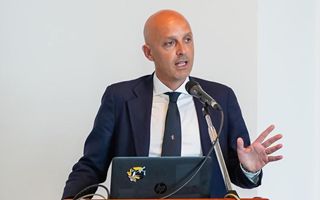(Finance) – “A clear message comes from Naples: professionals are at the service of companies, especially in moments of greatest difficulty. The application of the tools provided by the new ‘Crisis Code’ allows you to address and resolve multiple problems, representing a concrete opportunity to helpand companies to overcome situations of economic difficulty.
Thanks to the negotiated settlement, the entrepreneur can maintain full control of his company, making use of the support of qualified and competent professionals in the use of effective economic tools. This approach allows us to identify targeted solutions and guarantee continuity for the company, even in the most complex moments.”
He declared it Matteo De Lise, national president of Aiecc (Italian Association of Experts in Crisis Composition), during the congress “Company recovery strategy in the crisis code and in the CNC: the corrective 136/24, the application practices and the European insolvency law” in the two Neapolitan days at the Excelsior hotel.
The role of accountants has been underlined by Livia De Gennaro, magistrate of the insolvency procedures section of the Court of Naples: “Professionals play a central role in supporting the entrepreneur in identifying the strategies that a company must adopt to emerge from the period of economic crisis. The instruments of the negotiation composition, the role of creditors and banks, fundamental for the purposes of financing concessions, are all aspects that need to be studied in depth to give substance to this instrument”.
He focused on the legislative innovations Eraldo Turi, number one of the Odcec of Naples: “The accountant is the interpreter and advocate of the resolution of the business crisis especially in light of the changes brought about by Legislative Decree 136/24 which modified the entire architecture of the negotiated composition by inserting the tax transaction. A tool that has increased the requests for access to this tool. It is thus possible to solve one of the main problems of the entrepreneur, that of not being able to pay taxes”.
According to Vincenzo Moretta, president of the Odcec Foundation of Naples: “The new business crisis code is certainly a great opportunity for accountants and entrepreneurs to avoid, through preventive actions, reaching a point of no return. The role of the accountant, with his experience, is central in this process so that it is activated from the first signs of difficulty to avoid default”.
For Gianluca Battaglia, advisor to the Order of Chartered Accountants and Accounting Experts of Naples: “Never before has the reform of the crisis code placed chartered accountants as the reference profession in this delicate procedure. We must intercept this opportunity given that the trend is to no longer make companies fail but to support them in order to recover. And who more than us, with the skills we have, can succeed in this task?”.
He spoke about the new code Ilaria Pagni, professor of civil procedural law at the University of Florence: “The crisis code is a new tool that offers professionals many opportunities. The important thing is that you need to read it carefully without using ‘old lenses’ taken from bankruptcy law, taking into account that the concept of crisis is not new but the tools, today, are different. It takes a lot of preparation and dedication, as well as attention to the entrepreneur, by accountants for a healthy and profitable collaboration between them”.
